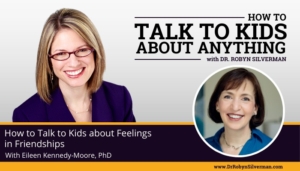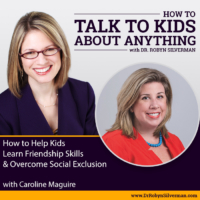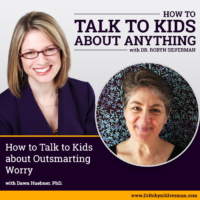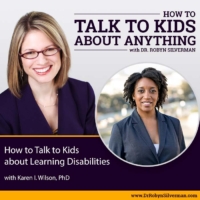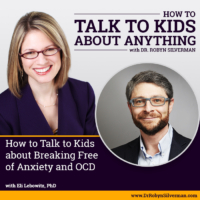Podcast: Play in new window | Download
Subscribe: Apple Podcasts | RSS | More
How to Talk to Kids about Difficult Feelings in Friendship
What kid doesn’t love the idea of “best friends forever!” but friendships are a lot morecomplicated than what we see portrayed in TVshows, in movies or on the internet. Why? Becausefriendships involve a lot of big, difficult feelings. We’ve talked about feelings a lot on this show—andthis time, we are applying them, specifically, to friendships. Almost all children know what it feelsliketo feel shy at a new school or at someone’s party, furious with a friend for not showing up ordivulging one of our secrets, sad when a friend moves away or chooses to sit somewhere else. Kidscare a lot about their friends—so it follows that they have big, emotional responses about them bothin and out of school. Let’s talk about how to help kids deal with their emotions about friends withfriend of the show, Dr. Eileen Kennedy-Moore
Eileen Kennedy-Moore, Ph.D., is an author, psychologist, and mom of four based in Princeton, NJ. She’s the creator of the kids Ask Dr. Friendtasticpodcast. Her recent books include Moody Cars(for ages 4-8), Growing Feelings: A Kids’ Guide to Dealing with Emotions about Friends and Other Kids(for ages 6-12), and Kid Confidence(for parents).
Important Messages:
- Importance of Friendship: Friendships of the toddler years to the more intimate and lasting friendships of the teen years are an increasing ability to understand someone else’s perspective.
- I think it’s really important to understand that we all make mistakes socially, and that’s okay as long as we don’t continue.
- Responding on Compliment: It’s like giving a gift because if somebody gives you a gift and you open it up and you go, “Thank you.”
- Emotions are social phenomena. They’re the link between our inner experience and the outside world.
- Starting a Friendship: Compliment is a great way to approach someone. We tend to like people who appreciate our finer qualities.
- Teach kids to humbly and kindly accept responsibility of their mistakes: An apology is the fastest way to repair a mistake. A lot of kids struggle with apologies because they think an apology means you admit your badness and you have not a shred of goodness within you. That’s not true. An apology is actually an expression of caring for the other person
- The wisest person sees that the glass is both half full and half empty at the same time.
- Tiny bit empty thinking: So here, the glass is filled to the brim except for one little drop and the person focuses only on that one little drop. Then, they’re missing the whole picture. It is a path to misery.
- Looking beyond the unfairness of that moment: Don’t be stuck focusing on the grievances and collecting them like beads on a string because that hurts us. That gets in the way of our enjoyment and full participation in life. We don’t want to say, “I can only be happy if everything is perfect.” because it’s not going to be perfect. This is a decision to just proceed even though the world isn’t perfect.
- Bring your best self to the party and when we are getting together with other people, we have a responsibility to add to the fun.
- Magnet myth of friendship: This is the belief that I have to be so amazing and impressive that people are drawn to me way a magnet attracts metal. This is a myth that is not how friendships work. If you are looking for that, “Wow. You’re amazing.” reaction. You are not looking for friends, you are looking for fans.
- Friendship is fundamentally a relationship between equals. Think of two overlapping circles. One circle is you and the other one is the kid. The part in the middle, which overlaps with each other, is your common ground. That’s where friendships grow.
Notable Quotables:
- “I think it’s really important to understand that we all make mistakes socially, and that’s okay as long as we don’t continue.”
- “An apology is actually an expression of caring for the other person.”
- “The wisest person sees that the glass is both half full and half empty at the same time.”
- “Look beyond the unfairness of that moment”
- “Don’t be stuck focusing on the grievances and collecting them like beads on a string because that hurts us, that gets in the way of our enjoyment and full participation in life.”
- “Magnet myth of friendship is the belief that I have to be so amazing and impressive that people are drawn to me way a magnet attracts metal. This is a myth that is not how friendships work. If you are looking for that, “Wow. You’re amazing.” reaction. You are not looking for friends, you are looking for fans.”
- “Friendship is fundamentally a relationship between equals. Think of two overlapping circles. One circle is you and the other one is the kid. The part in the middle, which overlaps with each other, is your common ground. That’s where friendships grow.”
Resources:
- Instagram: https://www.instagram.com/drfriendtastic/
- Book: https://www.amazon.com/Growing-Feelings-Dealing-Emotions-Friends/dp/1582708789
- Facebook: https://www.facebook.com/EileenKennedyMoore
- Podcast: https://linkin.bio/ig-drfriendtastic
- Tiktok: https://www.tiktok.com/@moodymoodycars

